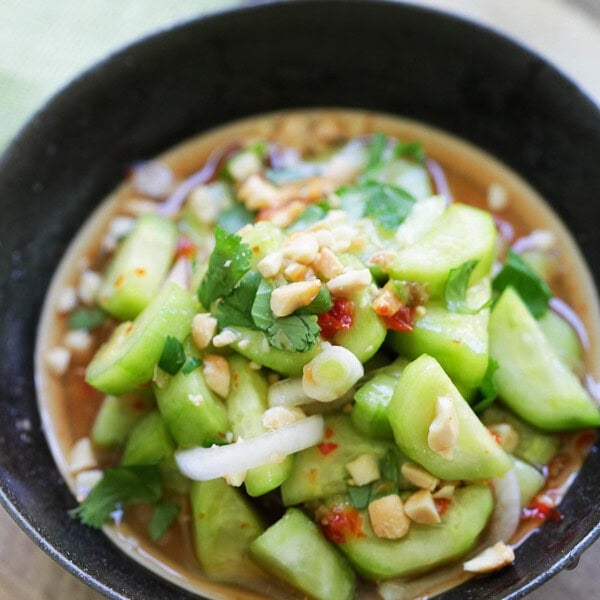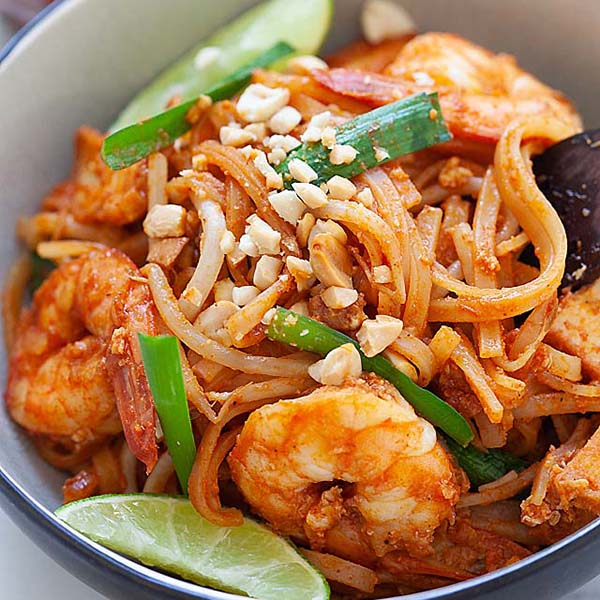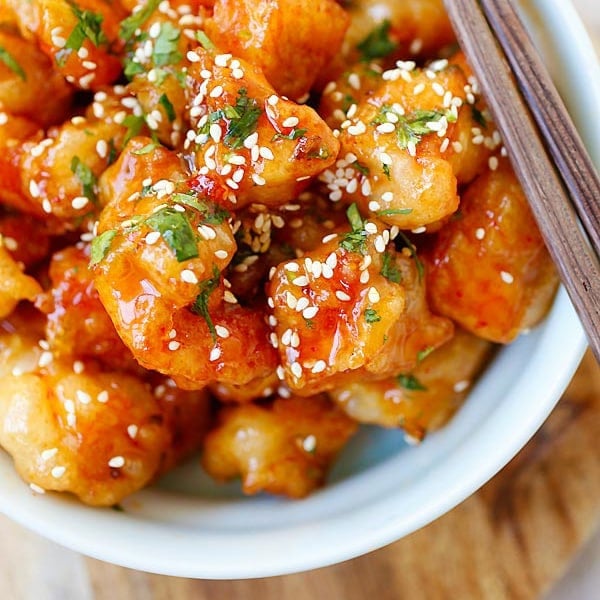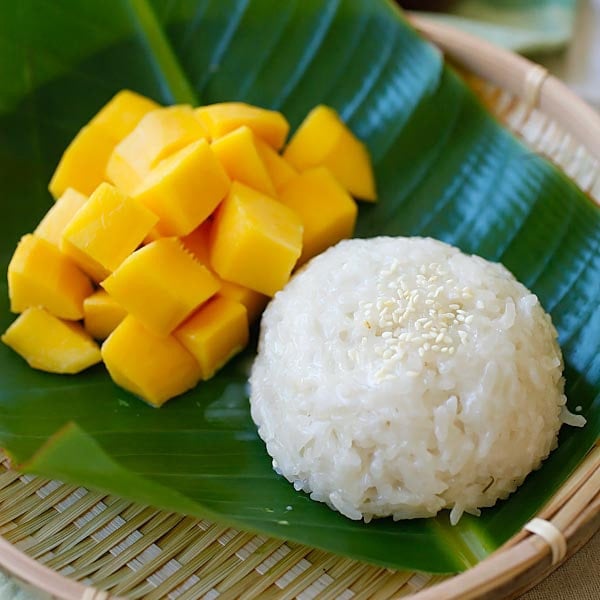This post may contain affiliate links. Please read my privacy policy.
This Tom Yum soup recipe is one of my all-time favorites to make at home! It’s the perfect mix of spicy, sour, and aromatic flavors from lemongrass, galangal, kaffir lime leaves, and chilies. Add in some shrimp and mushrooms, and you’ve got a comforting, flavorful bowl of Thai goodness that’s sure to hit the spot!
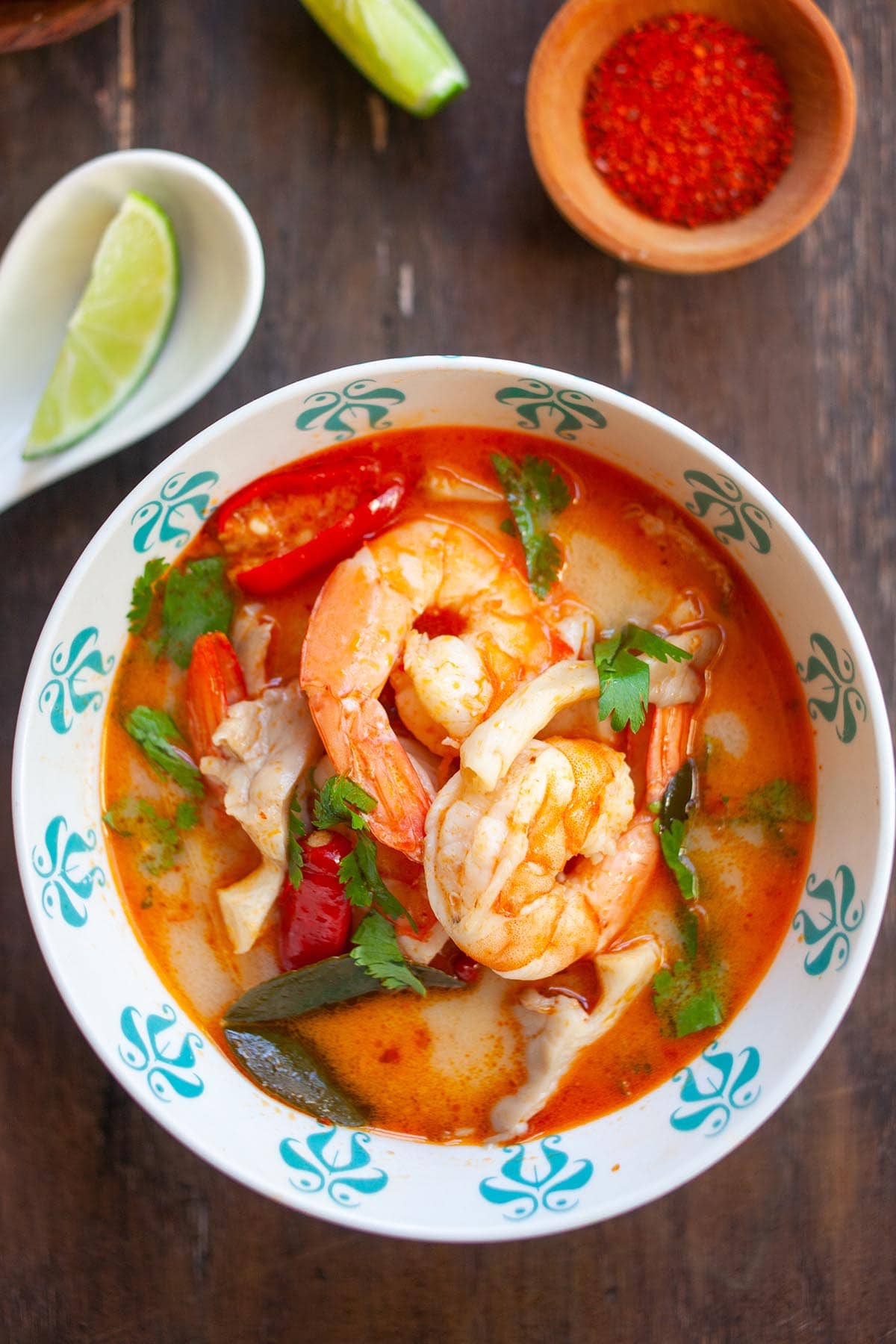
Table of Contents
- Authentic Tom Yum Soup Recipe
- What Is Tom Yum
- Types Of Tom Yum
- Difference Between Tom Yum And Tom Kha
- Ingredients You’ll Need
- How To Make Tom Yum
- Helpful Tips For Home Cooks
- The Secret Ingredients
- Frequently Asked Questions
- What To Serve With This Recipe
- Other Recipes You Might Like
- Tom Yum Soup (Best and Authentic!) Recipe
Authentic Tom Yum Soup Recipe
Soup is the ultimate comfort food, and for me, Tom Yum hits all the right notes for warmth, flavor, and nutrition. The mix of bold, spicy flavors and unique textures is something you just can’t find in any other soup!
If you love bold and spicy flavors like I do, this Thai soup recipe will totally satisfy your cravings—and then some! Don’t forget to check out my step-by-step video and my tips below to make sure you get the perfect bowl of Tom Yum every time!
Want something heavier in the stomach? Save my Thai Shrimp Noodle Soup and Tomyum Noodle Soup recipes for next time!
What Is Tom Yum
Aside from pad thai, Tom Yum (or Tom Yam) is probably one of the most well-known dishes in Thai cuisine. It’s famous for its bold, fiery flavors that even people who aren’t huge fans of spicy food can’t resist.
Often called Tom Yum Goong (with “goong” meaning shrimp in Thai), this soup is usually made with shrimp, but you can also use chicken or a mix of seafood like squid and scallops.
What makes this soup special is that it’s not just about the heat. It’s warm yet refreshing, making it perfect to enjoy on a chilly winter day or even a hot summer afternoon.
If you’re craving more spicy soup recipes, don’t miss my hot and sour soup!
Types Of Tom Yum
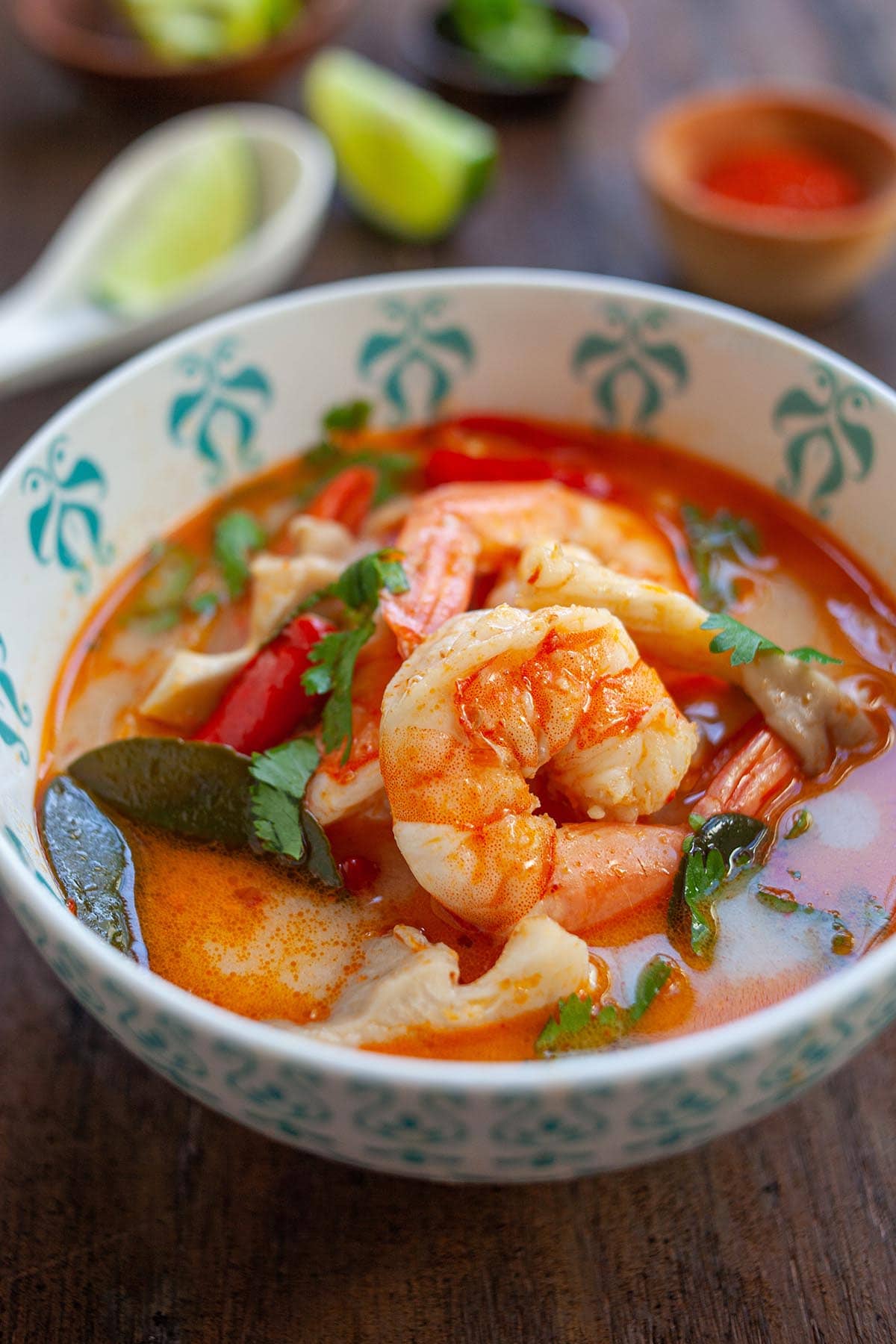
Of course, there’s the classic Tom Yum Nam Sai, made with a clear broth, but there’s also Tom Yum Nam Khon, the creamy version with evaporated milk. The creamy version is really popular in Bangkok and is great for those who prefer less heat.
Both versions are delicious, but I personally love the clear soup more for its authentic taste. The clear broth lets the tangy and spicy flavors really stand out, while the creamy version brings a bit of sweetness from the evaporated milk.
Difference Between Tom Yum And Tom Kha
Speaking of creamy soups, you might have come across Tom Kha, which is sometimes mistaken for the creamy version of Tom Yum.
The main difference is that Tom Kha uses coconut milk, while creamy Tom Yum uses evaporated milk. Plus, Tom Kha typically has chicken (Tom Kha Gai) as the main protein, whereas creamy Tom Yum usually features seafood.
Ingredients You’ll Need
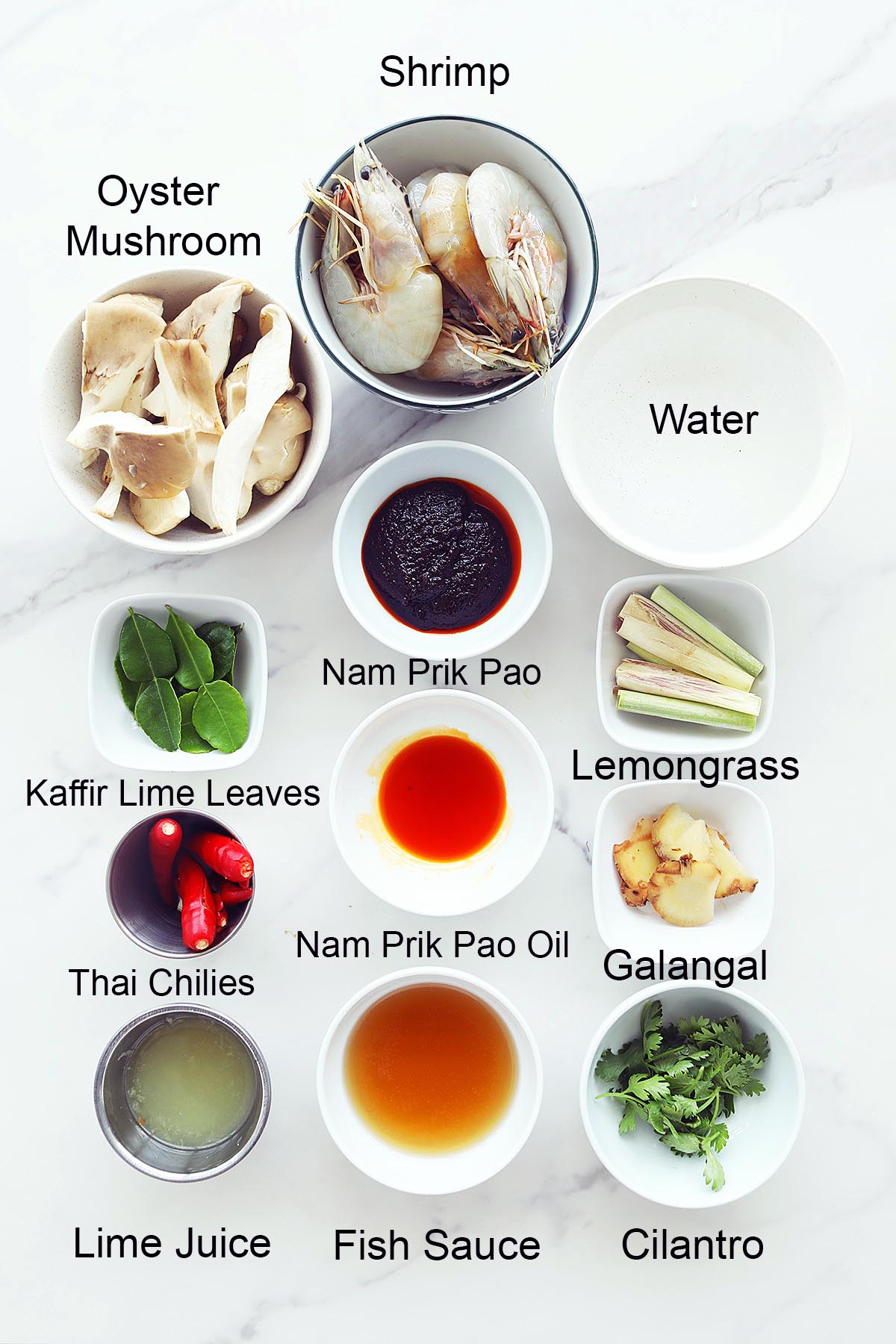
- shrimp – use medium to large whole shrimps and remove the heads and shells for the stock. You may also use tiger prawns here.
- shrimp stock – I highly recommend making your own from scratch. If you’re not making one, you can use chicken stock or plain water, but don’t expect it to be as good as the real deal.
- lemongrass – adds a citrusy and slightly minty flavor that’s unique to this soup. Use the bottom third of the stalk and pound it to release more flavor during boiling.
- galangal – sometimes called Thai ginger. It tastes like ginger, but it’s more peppery and citrusy. If you can’t find this, just skip it.
- kaffir lime leaves – kaffir or makrut lime leaves make this soup refreshing with its bold yet bright lemony taste. Try to find fresh leaves in large grocery stores or Asian stores, buy a bunch, and freeze whatever you don’t need for later use so you’ll always have some on hand for Thai Panang Curry or even Beef Rendang.
- chili – I use bird’s eyes chilies or Thai chilies for the heat. But I also add nam prik pao (Thai roasted chili paste) as well as the oil that floats on top for an intense shrimp flavor with a touch of heat and sweetness. I recommend the brand Pantai for this one.
- mushrooms – You can use oyster mushrooms, but straw mushrooms work fine too.
- lime juice – adds a tart and refreshing element to the soup.
- fish sauce – essential in Thai cooking. It has a nice umami that perfectly complements all the other flavors!
Please refer to the recipe card at the bottom of this post for full details on each ingredient.
How To Make Tom Yum
Like most Thai dishes, this soup is all about balance. That sweet spot between spicy, sour, and savory is what makes it crazy delicious!
And it all starts with the stock. I can’t stress enough how important it is to make your own shrimp stock for this soup (or for any soup really). You want to get all those amazing flavors from the shrimp shells and head in the soup!
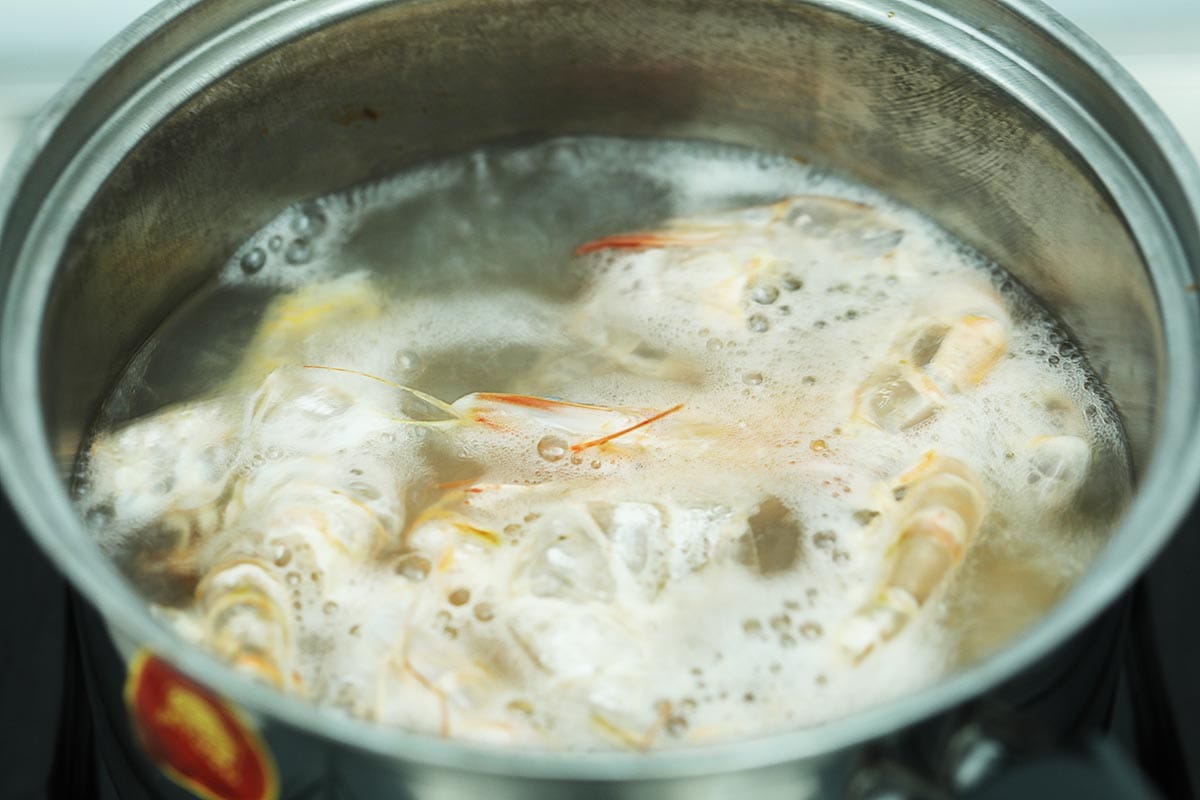
First, grab a pot and bring 3 cups of water to a boil. Toss in the shrimp heads and shells—they’re going to help us make a tasty shrimp stock. Let it boil until the water turns a bit orange, then use a spatula to press the heads and really get all that juice out. Let it simmer until the stock reduces down to 2 1/2 cups. Strain out the shrimp heads and shells—they’ve done their job!
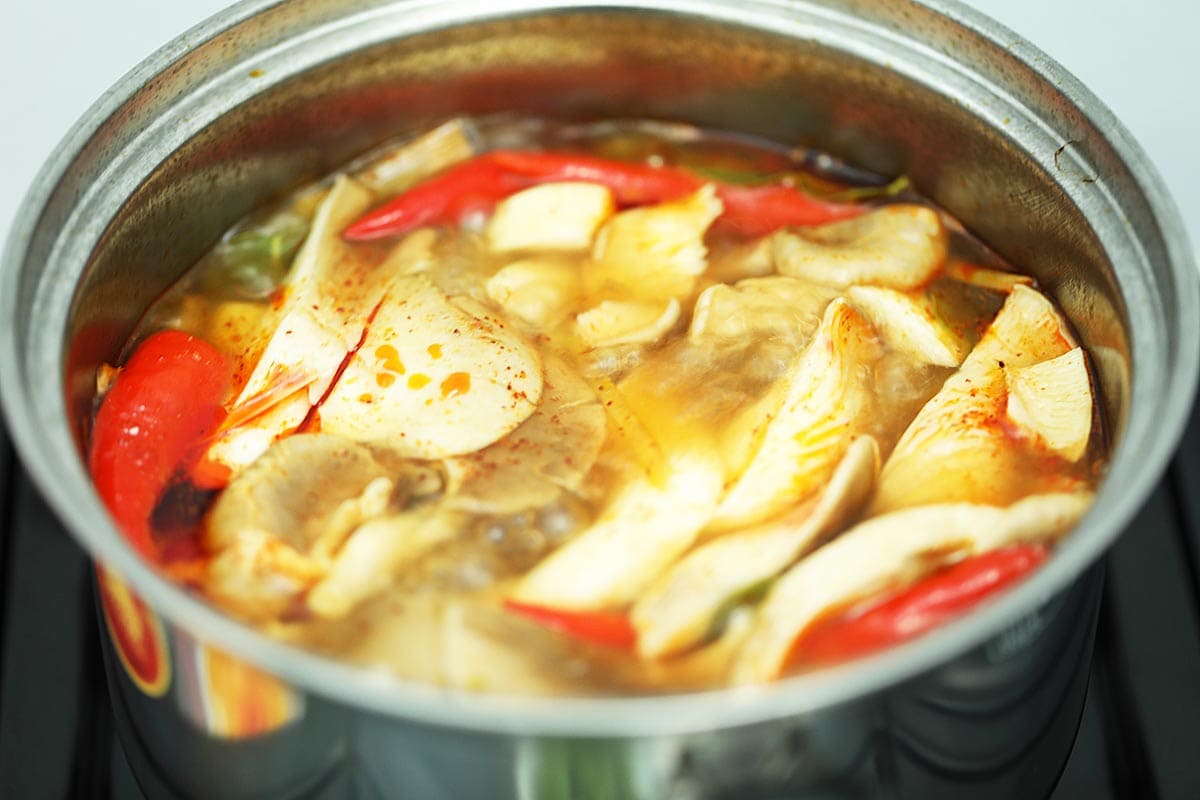
Next, turn up the heat and throw in some lemongrass, galangal, kaffir lime leaves, bird’s eye chilies, mushrooms, nam prik pao, and nam prik pao oil. Give it a good stir and let it come to a rolling boil.
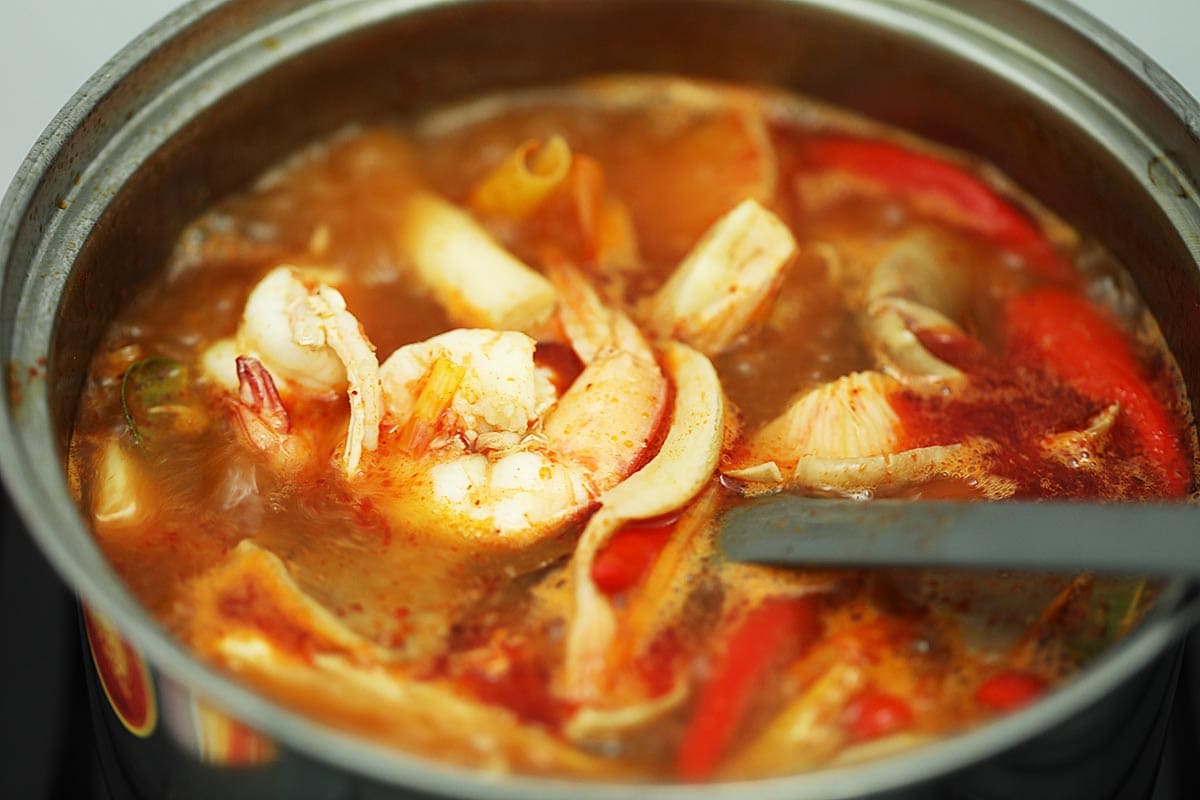
Once it’s there, add in the shrimp and fish sauce. Boil until the shrimp is cooked through, then toss in some lime juice.
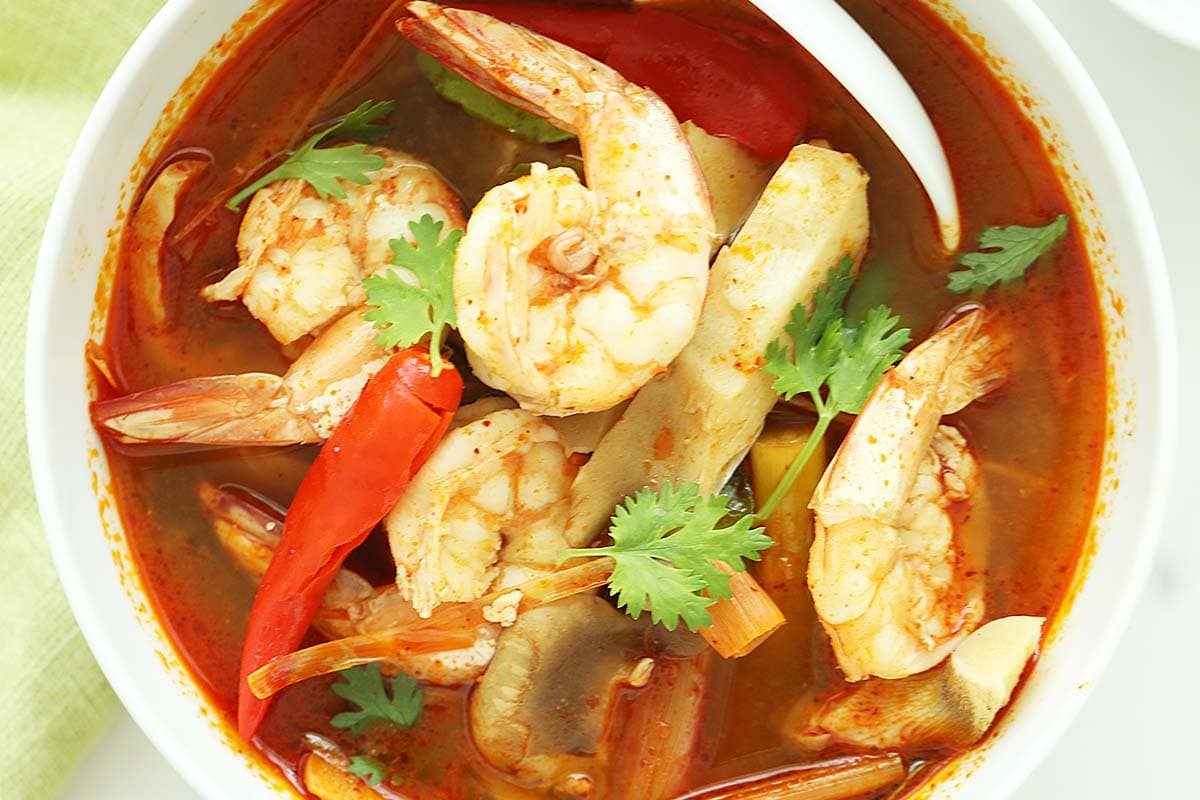
Serve it up hot in a bowl and sprinkle some cilantro leaves on top if you’re feeling fancy—it’s optional but makes it look super pretty!
Helpful Tips For Home Cooks
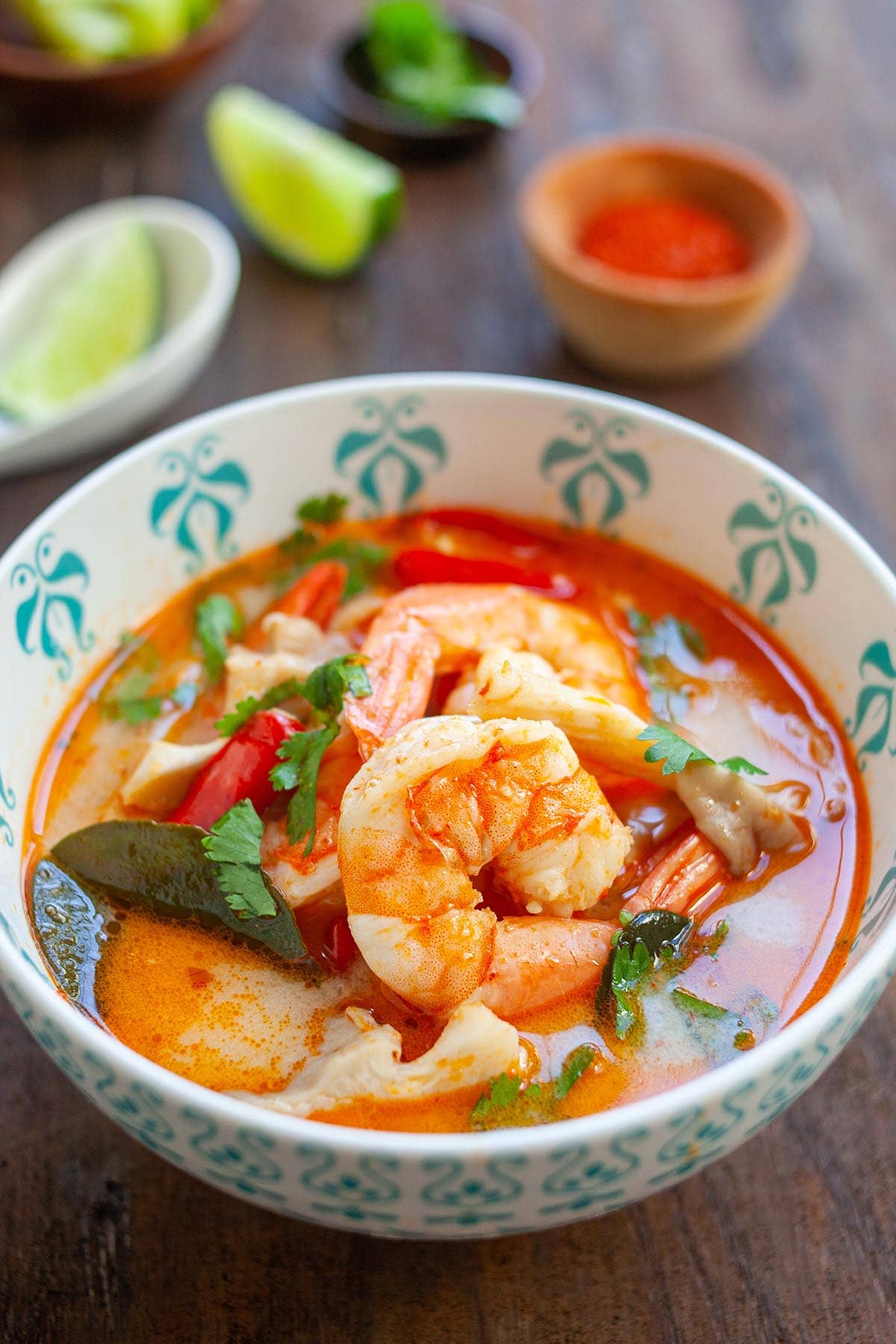
- The best Tom Yum starts with a rich shrimp stock, which I make by boiling shrimp heads and shells in water. This step really brings out that deep, savory flavor that’s as close as you can get to what you’d find at a Thai restaurant. If I don’t have shrimp heads, I’ll use canned chicken stock, but I make sure to pump up the flavor with extra herbs and seasonings.
- One ingredient you definitely can’t skip is nam prik pao, or Thai roasted chili paste. You can grab it at any Thai or Asian store, and it’s essential for that authentic taste. Don’t forget about the aromatics—galangal, lemongrass, kaffir lime leaves, and Thai or bird’s eye chilies—they’re the heart of the soup.
- I always add lime juice at the end to preserve its fresh, zesty punch. If you add it too early, it can get bitter and overpower all the other amazing flavors we’ve built.
- For a creamier, Bangkok-style Tom Yum, I’ll add a few tablespoons of evaporated milk. Just remember—NO coconut milk for this recipe!
- I recommend tiger prawn over regular shrimp for this recipe, but the best is fresh water prawn.
The Secret Ingredients
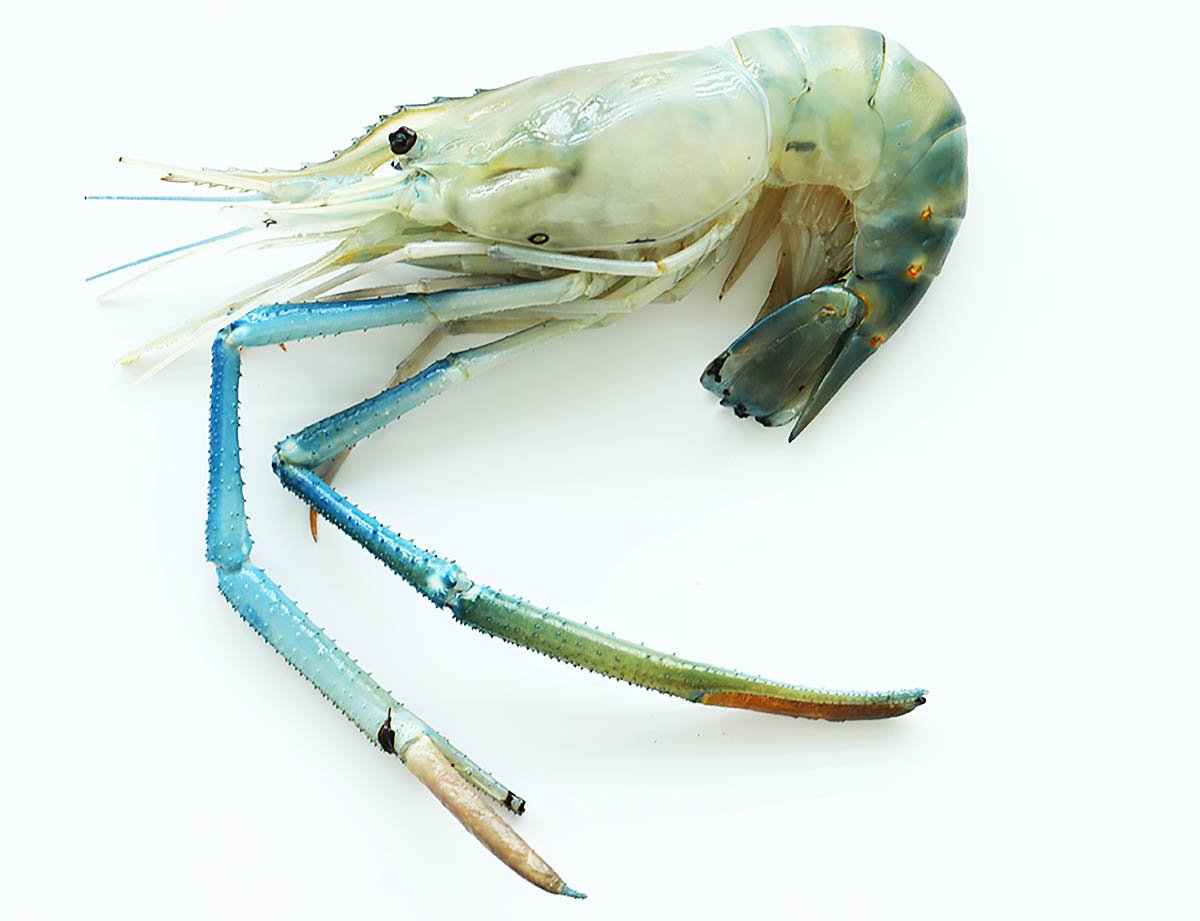
Other than the chef’s tips above, I am going to let you in on three secret ingredients for the most authentic rendition of this iconic soup, just like the street vendors in Bangkok.
- Fresh water prawn. The creamy fat from the prawn makes the soup broth intensely flavorful and thicker. In fact, in Bangkok, the best versions are always made with fresh water prawn. You may slice them lengthwise to expose the fat in the head before cooking. You can buy frozen fresh water prawn at Asian grocery stores in the US.
- Tamarind juice. If you like extra tartness and a more pronounced sour note in the soup, add 1 tablespoon of tamarind juice to the soup. You may use tamarind extract and dilute with some water.
- Sawtooth herb. Although it’s not used in the original version of Tom Yum, this herb has since been added to the recipe. I love the texture and earthy nuance of this herb.
Frequently Asked Questions
Absolutely! Tom Yum is made with various herbs and spices with excellent antioxidant and anti-inflammatory properties. It’s also relatively low in calories and fat, with just 270 calories per serving. It’s a great option for a quick and healthy meal, especially on cold winter nights.
Tom Yum is known for its spicy kick, which comes from the use of fresh Thai chilies in the soup. It almost always has to be spicy for it to be considered authentic.
Yes! While this soup is traditionally known for its intense spice level, you can make a milder version by removing the seeds from the chilies before adding them to the soup or reducing the amount of chilies altogether. When removing the seeds from Thai chilies, make sure you were a pair of gloves as the seeds will leave a burning sensation on your bare hands, for a few hours!
Tom Yum doesn’t usually have tomato in it, but if you like the extra sweetness and acidity it brings, go ahead and add it! Just know it’ll change the flavor a bit, but it’ll still taste amazing.
Not really! The aromatics such as galangal, lemongrass, kaffir lime leaves are not meant to be eaten. They are used in the recipe to enhance the flavor of the soup.
Yes, you can totally scale this recipe to serve more people! Just multiply the ingredients to match how many you’re serving. The flavor balance should stay pretty much the same, but I recommend tasting as you go—especially with things like lime juice, chilies, and nam prik pao. You might need to adjust the seasoning a little, but the flavors will still come through beautifully.
Tom Yum Soup is good for you, with just 270 calories per serving and very low fat (4g only).
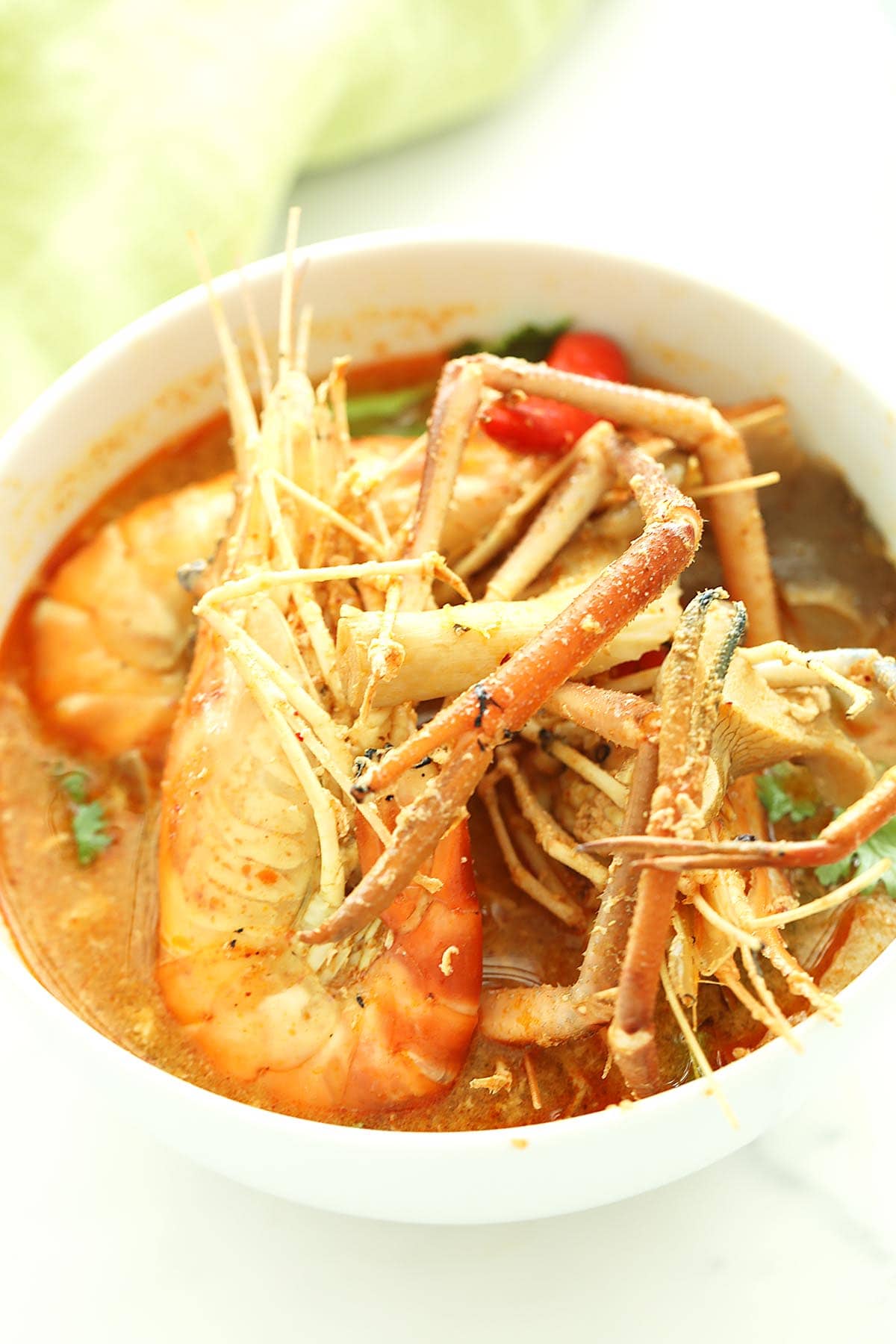
What To Serve With This Recipe
This popular soup is best served hot with a side of steamed rice. For a Thai-theme dinner at home, you would love these Thai food favorites:
I hope you enjoy this post as much as I do. If you try my recipe, please leave a comment and consider giving it a 5-star rating. For more easy and delicious recipes, explore my Recipe Index, and stay updated by subscribing to my newsletter and following me on Facebook, Pinterest, and Instagram for new updates.
Additionally, feel free to explore my other authentic Thai recipes, such as Pad See Ew next. They are all amazing and taste just like the ones in Bangkok!
Other Recipes You Might Like
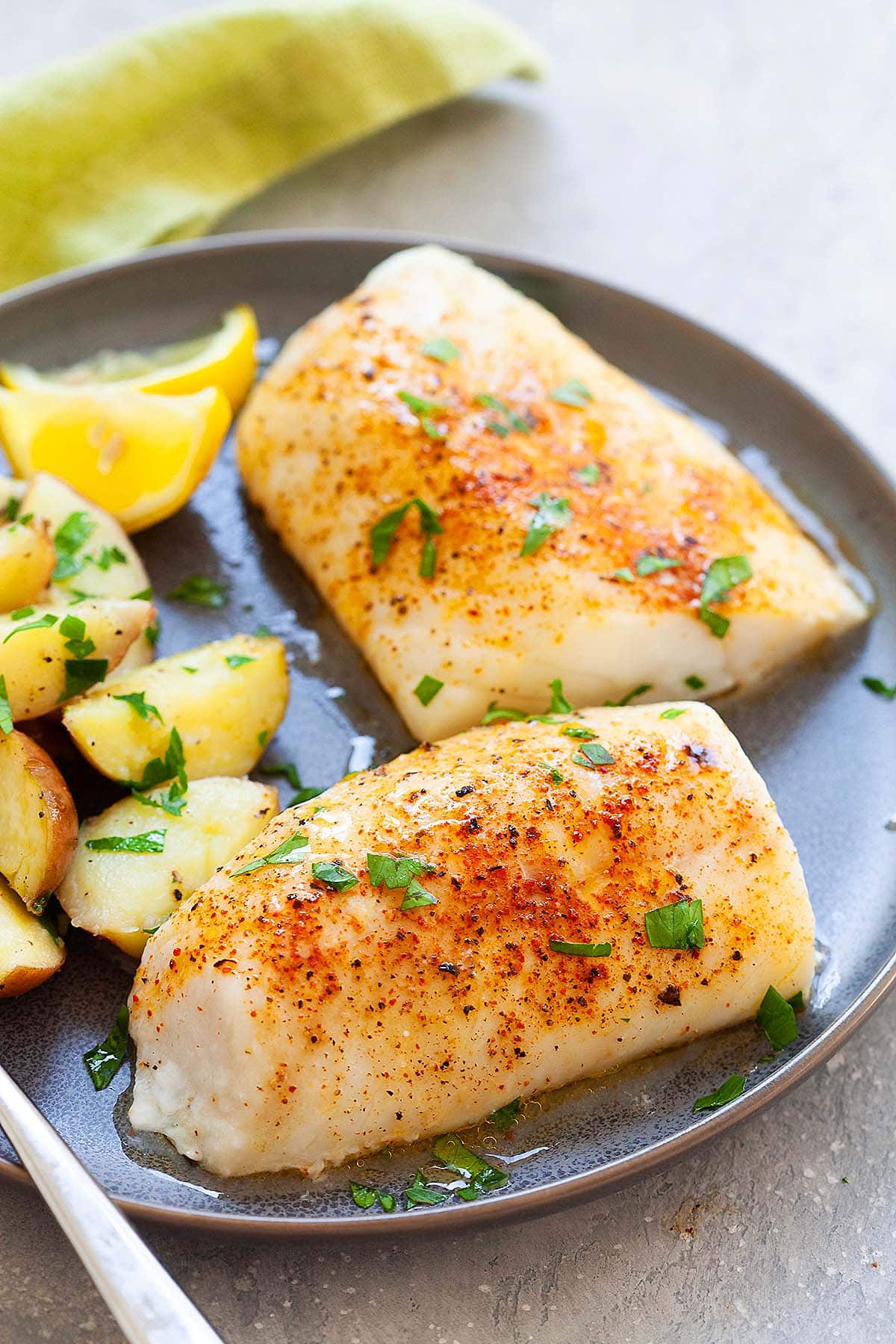
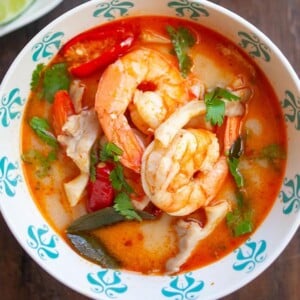
Tom Yum Soup (Best and Authentic!)
Ingredients
- 3 cups water, reduced to 2 1/2 cups
- 12 oz. (350g) shrimp, head-on and shell on or tiger prawn, head and shells peeled and deveined
- 1 stalk lemongrass, cut into 3-inch (7cm) strips, pounded with a cleaver
- 3 slices galangal
- 6 kaffir lime leave, bruised
- 6 Thai chilies, bird's eye chilies, pounded
- 6 fresh oyster mushrooms, cut into pieces
- 2 tablespoons nam prik pao, Thai roasted chili paste
- 2 tablespoons nam prik pao oil
- 3 teaspoons fish sauce
- 3 1/2 tablespoons lime juice
- cilantro leaves, , for garnishing, optional
Instructions
- In a pot, bring 3 cups of water to boil. Add the shrimp heads and shells to make shrimp stock. Boil until the water turns slightly orange. Press the shrimp heads with a spatula to extract the juice from the heads. Simmer and let the stock reduce to 2 1/2 cups. Drain the shrimp stock and discard the shrimp heads and shells.
- Turn the heat to high and add the lemongrass, galangal, kaffir lime leaves, bird’s eye chilies, mushroom, nam prik pao, and nam prik pao oil to the shrimp stock.
- Bring it to a rolling boil before adding in the shrimp and fish sauce. Boil until the shrimp is cooked, then add the lime juice.
- Serve the soup in a bowl and garnish with cilantro leaves (optional).
Video
Notes
- The best Tom Yum starts with a rich shrimp stock, which I make by boiling shrimp heads and shells in water. This step really brings out that deep, savory flavor that’s as close as you can get to what you’d find at a Thai restaurant. If I don’t have shrimp heads, I’ll use canned chicken stock, but I make sure to pump up the flavor with extra herbs and seasonings.
- One ingredient you definitely can’t skip is nam prik pao, or Thai roasted chili paste. You can grab it at any Thai or Asian store, and it’s essential for that authentic taste. Don’t forget about the aromatics—galangal, lemongrass, kaffir lime leaves, and Thai or bird’s eye chilies—they’re the heart of the soup.
- I always add lime juice at the end to preserve its fresh, zesty punch. If you add it too early, it can get bitter and overpower all the other amazing flavors we’ve built.
- For a creamier, Bangkok-style Tom Yum, I’ll add a few tablespoons of evaporated milk. Just remember—NO coconut milk for this recipe!
- I recommend tiger prawn over regular shrimp for this recipe, but the best is fresh water prawn.
Nutrition
Nutrition information is automatically calculated, so should only be used as an approximation.
